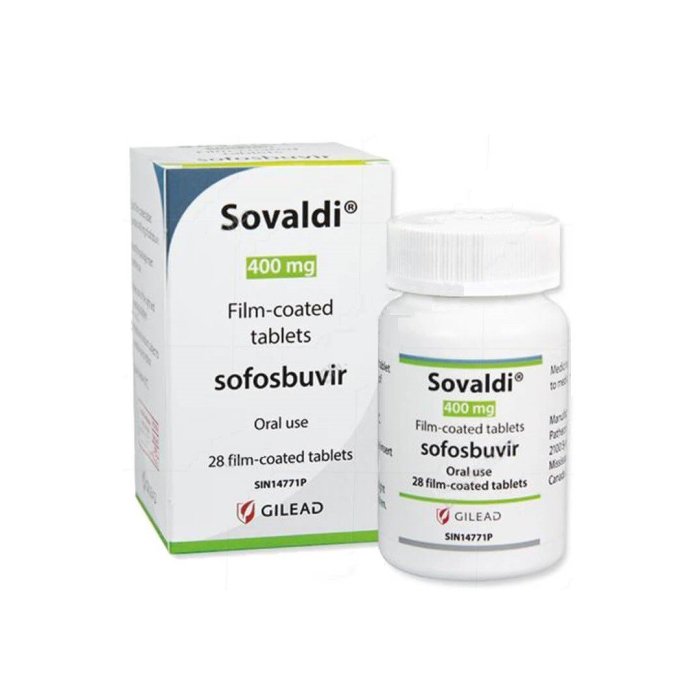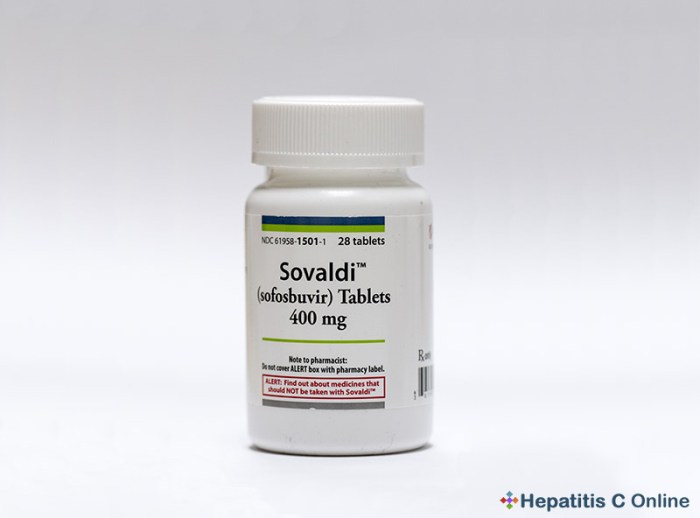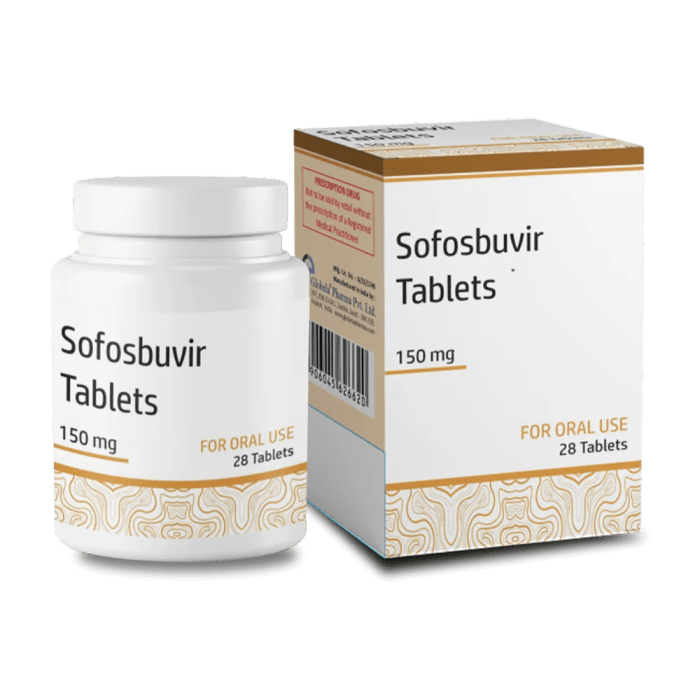Sofosbuvir, a revolutionary antiviral medication, has transformed the landscape of hepatitis C treatment. This drug, a nucleotide analog polymerase inhibitor, targets the hepatitis C virus (HCV) directly, disrupting its replication process. Its effectiveness extends across multiple genotypes of HCV, offering hope to a vast population affected by this chronic liver disease.
The introduction of sofosbuvir has ushered in an era of highly effective and well-tolerated therapies for HCV. With a significantly reduced risk of side effects compared to older treatments, sofosbuvir has revolutionized patient care and improved long-term outcomes for countless individuals.
Sofosbuvir

Sofosbuvir is a potent antiviral medication used to treat chronic hepatitis C virus (HCV) infection. It belongs to a class of drugs called nucleotide polymerase inhibitors, which work by interfering with the replication of the HCV virus.
Mechanism of Action
Sofosbuvir inhibits the HCV NS5B polymerase, an enzyme essential for viral replication. The NS5B polymerase is responsible for copying the HCV RNA genome, which is necessary for the virus to produce new viral particles. Sofosbuvir acts as a chain terminator, meaning it blocks the polymerase from adding new nucleotides to the growing RNA chain, effectively stopping the replication process.
Genotype-Specific Effectiveness
Hepatitis C virus (HCV) is classified into six major genotypes (1-6) and numerous subtypes, with genotype 1 being the most common. Sofosbuvir’s effectiveness varies depending on the HCV genotype.
- Sofosbuvir is highly effective against genotypes 1, 2, 3, and 4, often achieving sustained virological response (SVR), which means the virus is undetectable in the blood 12 weeks after completing treatment.
- Sofosbuvir is less effective against genotype 6, and treatment regimens typically include additional medications.
- Sofosbuvir is not recommended for treating genotype 5, as it has limited efficacy against this genotype.
Common Side Effects
Sofosbuvir is generally well-tolerated, but some common side effects can occur. These include:
- Headache
- Fatigue
- Nausea
- Diarrhea
- Skin rash
Most side effects are mild and usually resolve on their own. However, it is important to report any unusual or severe side effects to your healthcare provider.
Sofosbuvir in Clinical Practice

Sofosbuvir, a potent antiviral medication, has revolutionized the treatment of chronic hepatitis C virus (HCV) infection. Its introduction in 2013 marked a significant advancement in HCV therapy, offering high cure rates and improved tolerability compared to previous regimens. This section delves into the clinical application of sofosbuvir, exploring its standard treatment regimens, factors influencing regimen selection, and illustrative clinical trials that have demonstrated its efficacy.
Standard Treatment Regimens
Sofosbuvir is typically administered in combination with other antiviral medications, forming a complete treatment regimen. The specific combination chosen depends on several factors, including the HCV genotype, presence of cirrhosis, prior treatment history, and patient characteristics.
- Sofosbuvir/ledipasvir (Harvoni): This fixed-dose combination is highly effective for treating genotypes 1, 4, 5, and 6 HCV infections, with cure rates exceeding 90%. It is often considered the first-line treatment for many patients.
- Sofosbuvir/velpatasvir (Epclusa): This combination is effective against all six HCV genotypes and is particularly advantageous for patients with genotype 3 infection. It offers a pan-genotypic treatment option with high cure rates.
- Sofosbuvir/ribavirin: This combination is typically used for patients with genotype 2 or 3 HCV infection who have not responded to previous treatments or have cirrhosis. Ribavirin enhances the efficacy of sofosbuvir in these challenging cases.
- Sofosbuvir/daclatasvir: This combination is effective for genotypes 1 and 3 HCV infection, particularly for patients with cirrhosis or who have previously failed treatment.
The duration of treatment with sofosbuvir-based regimens typically ranges from 8 to 12 weeks, depending on the specific combination and patient factors.
Factors Influencing Regimen Selection
The selection of a specific sofosbuvir-based regimen for a patient involves careful consideration of several factors:
- HCV Genotype: Different HCV genotypes respond differently to antiviral medications. Genotype 1 is generally more challenging to treat than other genotypes.
- Presence of Cirrhosis: Liver cirrhosis can affect the efficacy of treatment and requires a more tailored approach.
- Prior Treatment History: Patients who have previously failed treatment with other HCV medications may require different regimens.
- Patient Characteristics: Factors such as age, gender, and co-existing medical conditions can influence treatment decisions.
- Drug Interactions: Sofosbuvir can interact with certain medications, necessitating careful consideration of potential drug interactions.
- Cost: The cost of different sofosbuvir-based regimens can vary significantly, influencing treatment selection.
Clinical Trials Evaluating Sofosbuvir Efficacy
Numerous clinical trials have demonstrated the remarkable efficacy of sofosbuvir in treating HCV infection.
- The NEUTRINO Trial: This phase 3 trial evaluated the efficacy and safety of sofosbuvir/ledipasvir in patients with genotype 1 HCV infection. The results showed a sustained virological response (SVR) rate of 99% at 12 weeks after treatment.
- The ASTRAL-1 and ASTRAL-2 Trials: These phase 3 trials evaluated the efficacy and safety of sofosbuvir/velpatasvir in patients with various HCV genotypes. The trials demonstrated SVR rates exceeding 95% across all genotypes.
- The ION-1 and ION-2 Trials: These phase 3 trials evaluated the efficacy and safety of sofosbuvir/ribavirin in patients with genotype 2 or 3 HCV infection. The trials demonstrated SVR rates of 85-95% in these challenging patient populations.
These clinical trials provide strong evidence for the efficacy and safety of sofosbuvir-based regimens in achieving high cure rates for HCV infection.
Resistance to Sofosbuvir

Sofosbuvir, a potent antiviral drug, has revolutionized the treatment of chronic hepatitis C virus (HCV) infection. However, the emergence of resistance to sofosbuvir poses a significant challenge to achieving sustained virological response (SVR) in all patients. Understanding the mechanisms of resistance, its implications, and strategies for managing it is crucial for optimizing treatment outcomes.
Mechanisms of Resistance to Sofosbuvir
Sofosbuvir inhibits the HCV NS5B polymerase, an enzyme essential for viral replication. Resistance to sofosbuvir arises from mutations in the NS5B gene, specifically within the active site of the polymerase. These mutations alter the enzyme’s structure, preventing sofosbuvir from binding effectively and inhibiting its activity.
- M282I/T/V: These mutations are the most common and are associated with a significant reduction in sofosbuvir’s antiviral activity. These mutations disrupt the interaction between sofosbuvir and the NS5B polymerase, preventing the drug from binding to the active site.
- S282T: This mutation has been observed in patients with pre-existing resistance to sofosbuvir. It has a moderate impact on sofosbuvir’s antiviral activity.
- L93M: This mutation has been reported to be associated with resistance to sofosbuvir, but its clinical significance remains unclear.
- Other mutations: Several other mutations have been identified in the NS5B gene that can contribute to sofosbuvir resistance. However, their clinical relevance and frequency are less well-established.
Implications of Resistance to Sofosbuvir
Resistance to sofosbuvir has significant implications for treatment outcomes. The emergence of resistance can lead to:
- Treatment failure: Patients with resistance to sofosbuvir may not achieve SVR, even with prolonged treatment. This can lead to persistent HCV infection, ongoing liver damage, and increased risk of complications such as cirrhosis and hepatocellular carcinoma.
- Need for alternative treatment regimens: Resistance to sofosbuvir necessitates the use of alternative antiviral therapies, which may have different side effect profiles and treatment durations.
- Increased healthcare costs: The need for alternative treatments and prolonged monitoring can significantly increase healthcare costs for patients with sofosbuvir resistance.
- Spread of resistance: The emergence of resistance in one patient can potentially contribute to the spread of resistant strains within the community.
Managing Resistance to Sofosbuvir
Managing resistance to sofosbuvir involves a multifaceted approach:
- Genotype testing: Determining the HCV genotype before initiating treatment is crucial for selecting appropriate regimens and minimizing the risk of resistance. Genotype 1 is associated with a higher risk of resistance to sofosbuvir compared to other genotypes.
- Baseline resistance testing: In high-risk patients, such as those with prior treatment failure or exposure to sofosbuvir, baseline resistance testing can identify pre-existing resistance and guide treatment decisions.
- Treatment optimization: Combining sofosbuvir with other antiviral agents, such as ribavirin or other NS5A inhibitors, can help overcome resistance and improve treatment outcomes.
- Monitoring for resistance: Regular monitoring of HCV RNA levels during treatment can detect early signs of resistance and allow for timely adjustments in therapy.
- Alternative treatment options: If resistance to sofosbuvir develops, alternative antiviral therapies with different mechanisms of action should be considered.
Sofosbuvir and Patient Outcomes
Sofosbuvir has revolutionized HCV treatment, offering patients significantly improved outcomes compared to older therapies. Its impact on the global burden of HCV infection has been profound, leading to a substantial reduction in morbidity and mortality.
Long-Term Outcomes of Sofosbuvir Treatment
Sofosbuvir-based regimens have consistently demonstrated high sustained virological response (SVR) rates, indicating long-term viral suppression and a high likelihood of cure. Studies have shown that SVR rates with sofosbuvir are significantly higher than those achieved with older therapies, such as pegylated interferon and ribavirin. This improved efficacy translates into better long-term outcomes for patients, including:
- Reduced risk of liver cirrhosis and liver cancer.
- Improved liver function and overall health.
- Lower risk of HCV transmission.
- Improved quality of life.
Impact of Sofosbuvir on the Global Burden of HCV Infection
The introduction of sofosbuvir has significantly impacted the global burden of HCV infection. Its high efficacy and shorter treatment duration have facilitated broader access to treatment, leading to:
- A substantial reduction in HCV-related morbidity and mortality.
- A decrease in the number of new HCV infections.
- Improved access to care for underserved populations.
- Reduced healthcare costs associated with HCV treatment and management.
Benefits and Limitations of Sofosbuvir
Sofosbuvir offers numerous benefits for patients with HCV infection, including:
- High SVR rates, leading to a high likelihood of cure.
- Shorter treatment duration compared to older therapies.
- Improved tolerability and fewer side effects.
- Oral administration, eliminating the need for injections.
However, there are also some limitations to consider:
- High cost, potentially limiting access for some patients.
- Potential for drug resistance, requiring careful monitoring and management.
- Limited availability in some parts of the world.
Future Directions in Sofosbuvir Research
Sofosbuvir, a groundbreaking antiviral medication for hepatitis C virus (HCV) infection, has revolutionized treatment approaches. However, ongoing research continues to explore new avenues for optimizing its efficacy and expanding its applications. This section delves into the future directions of sofosbuvir research, encompassing the development of novel therapies, potential combinations with other antiviral agents, and its role in emerging HCV treatment strategies.
New Sofosbuvir-Based Therapies
Research efforts are underway to develop new sofosbuvir-based therapies, aiming to address limitations of existing treatments and enhance patient outcomes. One prominent area of focus is the development of fixed-dose combinations, which simplify treatment regimens and improve adherence. For instance, sofosbuvir is currently available in fixed-dose combinations with other direct-acting antivirals (DAAs), such as ledipasvir and velpatasvir, offering convenient and effective treatment options.
Another avenue of exploration is the development of sofosbuvir-based therapies for specific patient populations, such as those with advanced liver disease or those who have failed previous treatment regimens. Researchers are investigating the use of sofosbuvir in combination with other DAAs or immunomodulatory agents to enhance treatment efficacy in these challenging cases.
Sofosbuvir in Combination with Other Antiviral Agents
The potential for sofosbuvir to be used in combination with other antiviral agents is a promising area of research. Combining sofosbuvir with other DAAs, such as ribavirin, has shown synergistic effects in clinical trials, leading to higher sustained virological response (SVR) rates. This approach holds potential for treating patients with challenging HCV genotypes or those who have developed resistance to other antiviral agents.
Furthermore, research is exploring the combination of sofosbuvir with non-DAA agents, such as interferon-alpha. This approach may be beneficial for patients with specific genotypes or those who cannot tolerate DAAs. Combining sofosbuvir with non-DAA agents may also help to address the issue of resistance development, as different mechanisms of action can target different aspects of the HCV lifecycle.
Sofosbuvir in Emerging HCV Treatment Strategies
Sofosbuvir’s role in emerging HCV treatment strategies is evolving as research progresses. One exciting area of research is the development of all-oral, interferon-free regimens, which offer significant advantages in terms of convenience, tolerability, and patient satisfaction. Sofosbuvir is a key component of many all-oral regimens, demonstrating its crucial role in achieving SVR rates close to 100%.
Another emerging strategy is the development of shorter treatment durations. Current guidelines recommend 8-12 weeks of treatment with sofosbuvir-based regimens, but research is exploring the feasibility of shorter durations, potentially reducing treatment costs and improving patient convenience. This approach may involve using higher doses of sofosbuvir or combining it with other DAAs with potent antiviral activity.
Sofosbuvir stands as a testament to the remarkable progress in antiviral therapy, offering a powerful weapon against the persistent threat of hepatitis C. While challenges remain, such as the emergence of resistance, ongoing research and development promise even more effective treatment options. The future of HCV treatment looks bright, fueled by the success of sofosbuvir and the ongoing pursuit of innovative solutions.
Sofosbuvir, a groundbreaking antiviral medication, has revolutionized the treatment of hepatitis C. Its effectiveness has led to significant improvements in patient outcomes, and its development highlights the importance of medical research and innovation. For those seeking to invest in real estate, consulting with a real estate attorney can provide valuable legal guidance and protect your interests. Understanding the legal complexities surrounding property transactions is crucial, and a real estate attorney can help navigate the process smoothly.
Just as sofosbuvir has changed the landscape of hepatitis C treatment, a skilled real estate attorney can help you navigate the complexities of the real estate market.